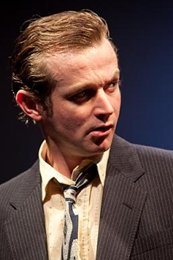Conal Creedon has extricated The Cure from his highly successful Cork trilogy of short plays premiered in 2005 during the European City of Culture year. Under his own direction this time, the one man show is standing on its two feet and shows no signs of jetlag after its arrival back in Cork from the Shanghair Jue Festival in China. It’s amazing to think of this play moving audiences in Shanghai, given that it is so deeply and colloquially Cork to the dirt under its fingernails - but it returned garlanded in very favourable reviews from that festival.
Perhaps it is the simplicity of the story that appeals. A man with a sore head after three days on the beer is waiting for a pub to open for the cure of the title. The light has gone out on his relationship with his wife and his wicked thirst is not his only drought on this particular morning of Christmas week.  Cork and the drinker’s sense of his life are examined through the prism of a single moment where the past paces the streets with him as his body – if not yet his soul – cries out for redemption. The High Noon moment comes when he appears to be cornered by his nemesis – an unchristian Brother who haunted his childhood – who is walking straight towards him. Will this be a moment of sweet revenge and violent retribution an unexpected resolution?
Cork and the drinker’s sense of his life are examined through the prism of a single moment where the past paces the streets with him as his body – if not yet his soul – cries out for redemption. The High Noon moment comes when he appears to be cornered by his nemesis – an unchristian Brother who haunted his childhood – who is walking straight towards him. Will this be a moment of sweet revenge and violent retribution an unexpected resolution?
With a real writer’s canniness Creedon opens the piece with an appeal to the senses. The central character’s grandfather follows his nose from home to work by the smells emanating from the shops, factories, slaughter-houses, pubs and sweet-makers. In this way the streets are made real for us before the stories unfold.
Slight and subtle design gives the staging some texture. The Half Moon stage is bare and played right to the black-painted rough brick wall expressively lit red to capture the rawness of the man with the head on him. Michael Lonergan’s lighting creates a school room with the shadow of a large sash window. The atmosphere of the remembered classroom is made almost demonic by Anth Kaley’s echoing reverberations of Aidan O’Hare’s voice of the Brother pacing between the desks and swooping violently on hapless schoolboys.
There is an economy of style to Creedon’s direction as the actor becomes the Brother with a startling flick of his coat-tails. At first it seems that the director may have represented these remembered moments a little too archly but it is the unfolding of the emotional layers of this particular story that is most satisfying as it moves from villainy to vulnerability.
Creedon’s words swing between the heightened lyrical descriptions to the most colloquial of exchanges. And he is equally comfortable in both, whether he’s writing sequences like the olfactory street scene or the comical depiction of the old schoolmate who has reincarnated himself as a posh and snotty Cork man with a rash of affectations.
In choosing this narrow prism to view Cork the particular becomes vivid and expressive but the reference to larger historical realities like the Burning of Cork in 1920 and the Celtic Tiger of recent times can’t find a focus and become merely spectral. Spectral too is the presence of women like the hint of a shadow-play in the background to the stories. We will have to wait for Creedon’s next trilogy to give his women their voices.
Aidan O’Hare is immense in this one-man show and his performance is compulsive viewing from start to finish. O’Hare is an actor who inhabits his part. You can sense his thumping headache and the drought inside him as he waits for the first drink on the morning after a three-day batter. And he is an actor who is pitch perfect on his Cork accents whether it’s our drunken hero or his father or the brother or the old school buddy who morphs into Number One Langer. The various characters are simply nailed by the writing the performance.
At 50 minutes it is probably too short a piece for the Burning of Cork to be much more than a whiff of smoke. But the closer Creedon attends to the smallest details in his compelling dramatic moment the more successful he is in summoning a world.
Liam Heylin